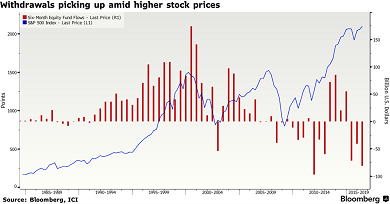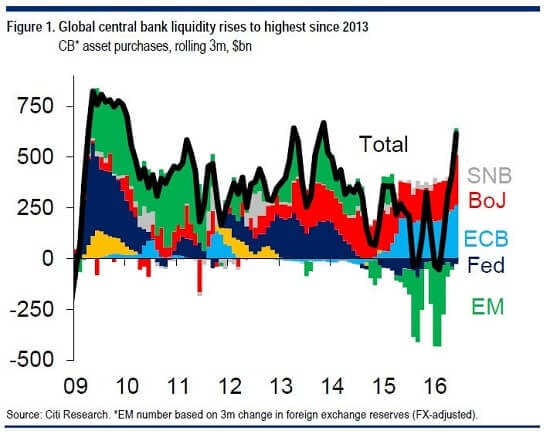People ask me all the time...
"How can the markets keep going up when everything else is going to hell in a handbasket?"
Believe it or not, I can explain the situation in five words.
You can understand it in two.
And you can do something about it in one.
In fact, word for word, this may wind up being the most profitable article you'll read all day.
Here's what it all boils down to...
Why You're Better Off "Long Than Wrong"
None of the headlines you see today cast doubt on the fact that the world is a dangerous, complicated, and nasty place.
...corporate earnings stink
...the geopolitical situation is terrible
...terrorism is on the rise
...Europe's a wreck
...politicians have no adult supervision in Washington
It's no wonder that U.S. stock funds just registered their 17th consecutive week of withdrawals, totaling $6.1 billion as of July 8, according to Lipper.

Investors have withdrawn more than $133 billion from global equity funds so far this year - nearly $80 billion of that coming from U.S. equities alone, according to Bank of America Merrill Lynch data.
And yet... the rally continues.
Yep.
The S&P 500 was back to all-time highs, the Dow hit an all-time high Monday, and the Nasdaq is past the critical 5,000-point threshold.
Now, here's why - in five words, as promised...
"Central banks continue to buy."
Right now global central bank buying is the highest we've seen since 2013.
We've talked about that in recent weeks as part of the Brexit discussions, when I told you that the bet would change from one of downside risk to policy-induced upside.
Now, we can see it too, in this chart from Citi Research.

So what does this mean for your money?
You're better off being "long than wrong," because central bankers are going to do everything they can to inflate asset prices by riding to the rescue once again.
Every central bank in the world is in on this. Yellen, Kuroda, Draghi - they've all got their hands in the cookie jar now, which means that stocks and bonds are going to run higher at the same time.
Therefore, the question is not "do I buy," like most people think... but rather, what.
Fortunately, this isn't complicated.
First, you want to buy the best stocks you can afford.
Most investors struggle with this concept because they don't know how to define "best" like we do. So they doom themselves to subpar returns and never achieve the kinds of big profits they crave, let alone deserve.
[mmpazkzone name="in-story" network="9794" site="307044" id="137008" type="4"]
Start by understanding the six Unstoppable Trends we talk about so frequently because they're backed by trillions of dollars in spending that central bankers cannot screw up and Wall Street cannot hijack.
Then, make a list based on which companies produce truly "must-have" goods and services that the world cannot live without. Put those with fortress-like balance sheets, strong business models, and proven results at the top of your list.
Everything else is a risk you don't want or need at the moment.
When it comes to bonds, stick to U.S. government paper and highly rated corporates. People fear a rate hike, but what they should be fearing is missing out on a rally.
Some 75% or more of those very same bonds I've just mentioned never get sold. They're owned by institutions, pension funds, and other parties who need the income and the stability they provide.
Like you, those big buyers are more concerned about the return of their money than the return on their money, especially now that central bankers are back to their old tricks.
Make that work in your favor instead of trying to fight it like many investors are right now.
And if you're worried that the markets could suddenly reverse course?
That's nothing out of the ordinary.
Millions of investors are fretting over it, but that's what prudent risk management is all about - and why we talk about it so frequently. Depending on your risk tolerance and financial objectives, you can use everything from trailing stops to inverse funds - and even options - as a means of not only protecting your capital but your profits, too.
Nobody doubts there will be a day of reckoning. Let's get that off the table right now.
Odds are, it's just not tomorrow.
And if you just can't get the notion that the sky is falling out of your head?
I hear that a lot.
Many people started saving late for retirement and feel like they can't take the time to wait for a recovery, let alone grow their money.
I beg to differ.
There are plenty of ways to profit in a bear market if you know what to look for, and I will show you exactly what those are if and when that day comes.
In the meantime, remember that one word I told you about earlier?
Here it is...
Buy!
A single share if you have to - hold your nose if needed.
Take a deep breath and make your move.
You have to be "in to win," and central bankers make that very clear.
I'll be with you every step of the way.
Follow Keith on Facebook and Twitter.
About the Author
Keith is a seasoned market analyst and professional trader with more than 37 years of global experience. He is one of very few experts to correctly see both the dot.bomb crisis and the ongoing financial crisis coming ahead of time - and one of even fewer to help millions of investors around the world successfully navigate them both. Forbes hailed him as a "Market Visionary." He is a regular on FOX Business News and Yahoo! Finance, and his observations have been featured in Bloomberg, The Wall Street Journal, WIRED, and MarketWatch. Keith previously led The Money Map Report, Money Map's flagship newsletter, as Chief Investment Strategist, from 20007 to 2020. Keith holds a BS in management and finance from Skidmore College and an MS in international finance (with a focus on Japanese business science) from Chaminade University. He regularly travels the world in search of investment opportunities others don't yet see or understand.



